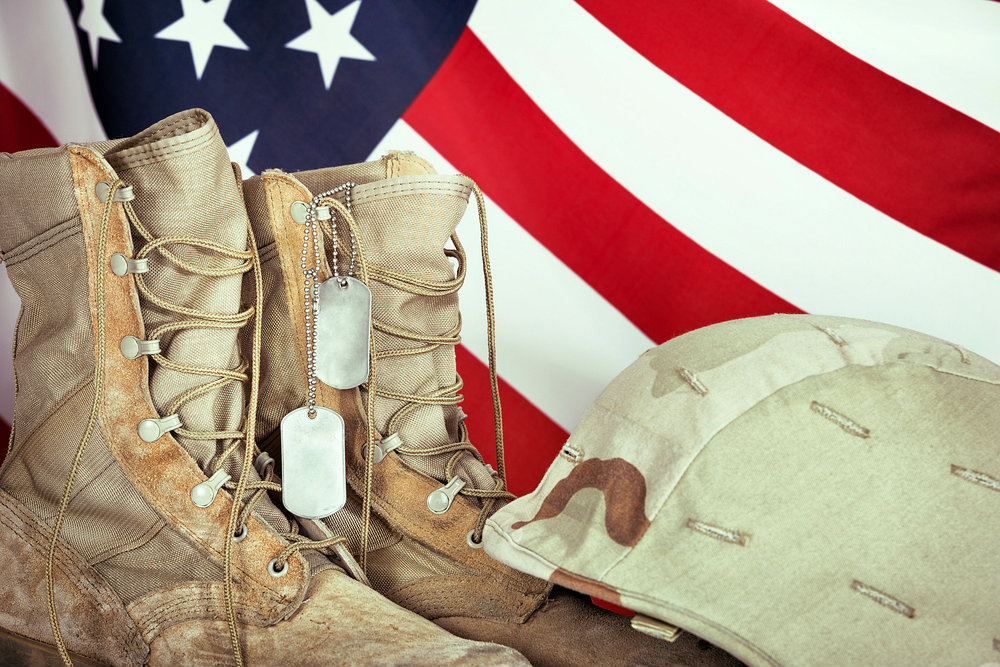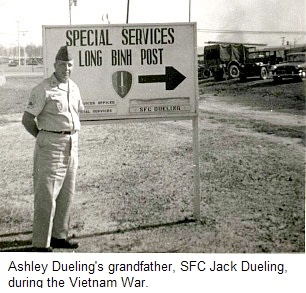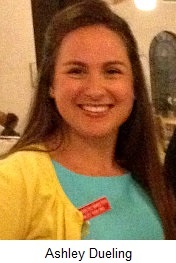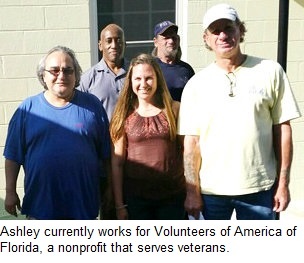MSW Alumna Story: A Career Helping Homeless Veterans
Graduate from Saint Leo's online MSW program is passionate about military social work and helping homeless veterans.

Graduate from Saint Leo's online MSW program is passionate about military social work and helping homeless veterans.

While acting as caregiver for her grandfather who had served in the Army, Ashley Dueling began Saint Leo's MSW program and discovered a passion for working with veterans.
 Ashley Dueling's grandfather, Jack Dueling, served in the U.S. Army for 22 years beginning in 1953 and throughout the Vietnam War until 1975. He served as an infantryman, achieving the rank of sergeant first class.
Ashley Dueling's grandfather, Jack Dueling, served in the U.S. Army for 22 years beginning in 1953 and throughout the Vietnam War until 1975. He served as an infantryman, achieving the rank of sergeant first class.
He received a Silver Star for gallantry in action during combat service in Vietnam, seven Good Conduct Medals, an Army Commendation Medal and more honors than could fit in the allotted space on his discharge papers. But he was most proud of being in the 82nd airborne division.
"My Papa was the type of solider the Army must have had in mind when they developed the slogan "Army Strong," says Ashley.
Jack Dueling passed away in 2013 at the age of 80. But while he was alive, he was a vital part of his granddaughter's life, teaching her many life lessons – how to take pride in what you do, how to be strong, how to laugh and how to love.
Ashley was her grandfather's caregiver during a time when he needed her support as a granddaughter and as a medical advocate.
And now, every day as she goes to work, she thinks about him and the extraordinary relationship they shared – and thanks him for setting her on the path to a career she loves as a military social worker.
 "My grandfather played a tremendous role in where I am today by inspiring my respect for the military and setting me up for the type of career I'm in," says Ashley.
"My grandfather played a tremendous role in where I am today by inspiring my respect for the military and setting me up for the type of career I'm in," says Ashley.
"I think it all relates to my passion for working with veterans. Every time I work with a veteran, I'm helping someone like him. It's my way of continuing his legacy."
Becoming a social worker was not Ashley's first career goal. Originally, she had planned on becoming a licensed diabetes educator -- that was until a state board discontinued the credential.
To do the work she desired, Ashley learned that she would need to pursue a master of social work (MSW) degree. So she applied and was accepted into Saint Leo's online MSW degree program.
As it turned out, social work was the perfect fit. Progressing through the program, Ashley discovered a fondness for it that surprised her.
 "In social work, you're able to spend time with people and see change. Based on the internships I had, I fell in love with it," Ashley says.
"In social work, you're able to spend time with people and see change. Based on the internships I had, I fell in love with it," Ashley says.
Now, she says she enjoys every day at work. "I don't feel like it's a job."
Ashley is currently a registered clinical social work intern at Volunteers of America of Florida, a nonprofit organization that counsels and provides supportive housing to homeless veterans. She also is in the first of two years of supervised experience to become a licensed clinical social worker.
Here are her thoughts about a career in military social work.
Why did you choose to study for your MSW at Saint Leo?
Ashley: It was convenient for my lifestyle at the time. My grandfather became really sick after falling and was in the hospital for months and then in long-term rehab. I was able to juggle being a full-time student, caregiver and be his advocate. My grandfather needed me. Saint Leo also helped me learn how to navigate the medical system.
How has your MSW degree from Saint Leo impacted your career?
Ashley: I wouldn't have a career if it weren't for Saint Leo. My professors were wonderful. You can feel their passion for social work and that passion is passed to us as students. They taught me the skills necessary to be a social worker. If they hadn't taught me those skills – such as how to connect with people from all facets of life – I probably wouldn't feel as competent as a social worker as I do. They don't just teach the content, but also how to find resources, how to connect with the community, how to figure out the law, and how to cope as a social worker because it can be exhausting some days.
I interned with Volunteers of America of Florida during my concentration year at Saint Leo. They ended up offering me a position as a case manager after I graduated in August 2014. In November, the clinician spot became available and I was promoted.
What's a typical day at Volunteers of America of Florida like for you?
 Ashley: No two days are the same. My responsibility as a case manager for veterans is to help them work towards certain goals and objectives. We provide the homeless veterans with housing, but just because they have a house doesn't mean they no longer have a homeless mentality. I work with veterans to connect them to the opportunities, resources, and programs they need, and follow up with them to learn what barriers they may face to getting (or keeping) a job or connecting with the resources we recommend.
Ashley: No two days are the same. My responsibility as a case manager for veterans is to help them work towards certain goals and objectives. We provide the homeless veterans with housing, but just because they have a house doesn't mean they no longer have a homeless mentality. I work with veterans to connect them to the opportunities, resources, and programs they need, and follow up with them to learn what barriers they may face to getting (or keeping) a job or connecting with the resources we recommend.
The veterans come to me with any personal issues they're having. It could be something as simple as an issue with a roommate. Or it could be more complex – issues related to their mental health that developed when they were in the military, such as anger, depression, anxiety, or combat stress. We work individually with the veterans and through group therapy to help them learn to cope. I also do initial mental health assessments for every new person we take into the program.
How do you manage to stay grounded in a career that deals with so many emotional and stressful situations?
Ashley: As social workers, we connect with other social workers. I have a really good team, supervisor, and manager I can go to. Having a healthy personal life is important, too. I'm a big runner and active outdoor person. Having people to go to and having coping mechanisms—what we teach our clients every day—is what we have to do as well.
What's the best thing about your job?
Ashley: I love what I do. I get a lot of fulfillment from working with veterans and I enjoy every day I go to work.
Working with veterans is my passion. Because of the military social work coursework and caring for my grandfather who served in the Army, I have a tremendous respect for military servicemembers. Our veterans have gone through a lot and they struggle with more things than the average civilian.
One of the most rewarding things for me is to see the change in someone for the better – for example, when a vet's PTSD isn't triggered as easily because you've helped him learn some coping skills. Seeing that change and being able to make a positive difference in someone's life brings me joy.
Ever since I was young, my goal has always been to make a difference in this life. I want to leave the earth a little bit better place than when I came into it. And I feel like I can do that every day with my social work degree.
Image credits: Leena Robinson on Shutterstock.com and courtesy Ashley Dueling